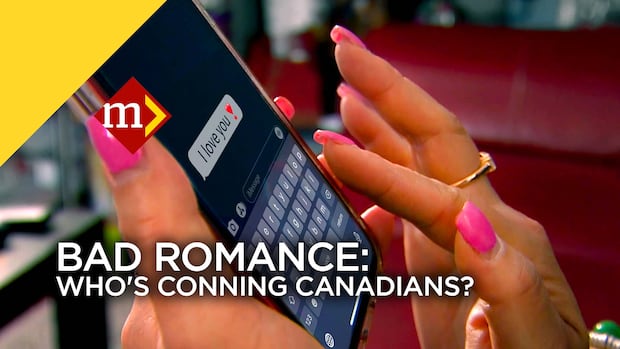Red flags for romance scams that Ontario police want you to know about
A job abroad, a sudden crisis, and requests for money are all warning signs, say OPP
They might have an exotic job — on an oil rig, as a military member stationed abroad, or as a doctor working with an international organization.
They'll claim to feel deeply connected to you, even to love you — but can't meet up. Ever.
Then, suddenly, they'll come to you with an emergency requiring an immediate money transfer, or with an enticing investment opportunity.
It's at this point that law enforcement hopes people will think twice and avoid joining an increasingly large group of Canadians: romance scam victims.
"It's really quite prevalent," said Ontario Provincial Police Det.-Const. John Armit, who has investigated romance scams for the past 11 years. "They are exploiting people who want newfound love."
In 2024, Canadians reported $58 million in romance scam losses to the Canadian Anti-Fraud Centre.
That's up substantially from pre-pandemic levels. In 2018, the scams cost Canadians $22.5 million. In 2017, it was closer to $17 million.
AI tools help scammers lie
Not only are the scams more common, Armit says, they're also more sophisticated, helped along by artificial intelligence, cryptocurrency, and the rise of online dating.
When the request for money is made, moving it via a cryptocurrency transfer makes it "virtually impossible to get back," said Armit — though there are some exceptions in which money is recovered.
To get people to believe in their new online relationships, scammers will also use AI "to spoof an image and a voice" or to write scripts for scammers to follow, he said.

A recent high profile example of a romance scam in France relied heavily on AI-generated images and videos of actor Brad Pitt, convincing a woman in her 50s they were in a relationship.
She was ultimately conned out of more than €830,000, about $1.25 million Canadian dollars.
"What I think it tells us is that hope really does spring eternal. People believe in fairy tales. People want a happy ending," said fraud prevention expert Vanessa Iafolla.
"Scammers are expert psychologists."
Be skeptical, expert says
Meanwhile, the number of victims continues to grow.
Police in Ontario are currently looking for a man who is alleged to have swindled nearly a dozen victims while claiming to be a military member stationed overseas.
Police say that after sending out random friend requests on social media, he'd begin talking with the people who accepted and established online relationships with them.
He then told victims he needed financial help to transition home from his deployment, with 11 victims from Ontario, Quebec, Alberta and Saskatchewan losing a total of $275,000.
Iafolla says the first line of defence is for individuals to protect themselves and maintain skepticism until online connections migrate into the real world.
"If you meet someone on an app, don't send them anything," she said. "Treat them like you would treat a stranger on the street, because, really, that's what they are."
With files from Ali Chiasson

